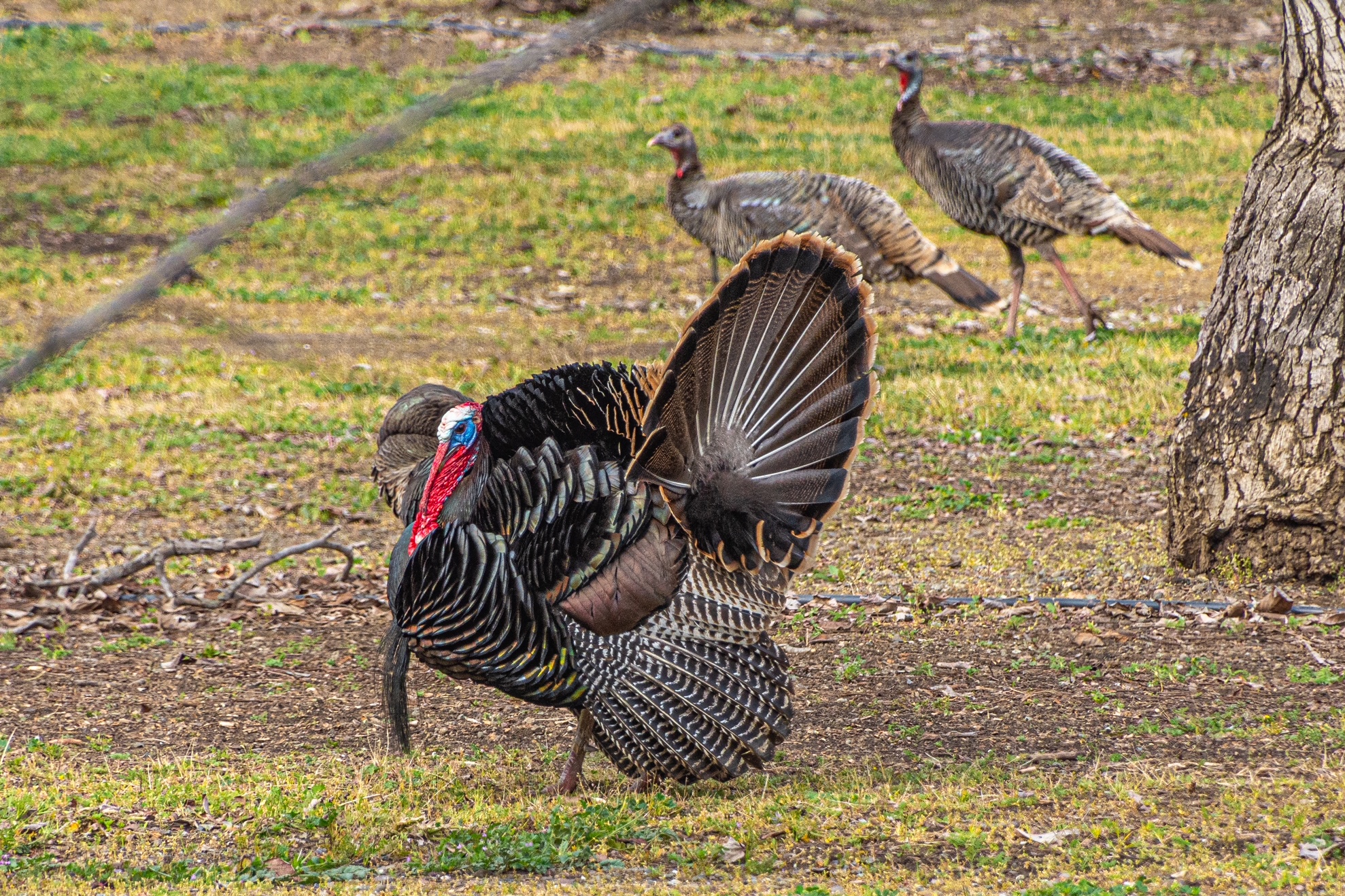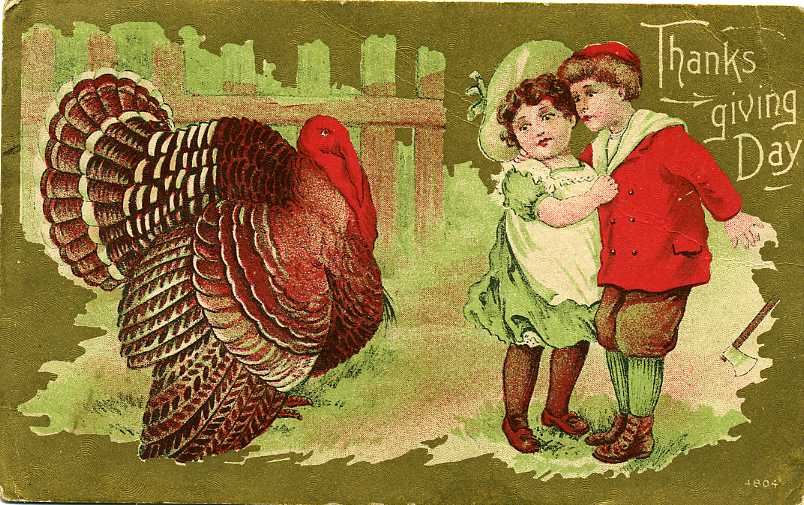Thanksgiving 2020
I’m an ordinary citizen. At this difficult time, there are so many people who support, in a great many ways, my own life and those of every one of us. All of them deserve our profound thanks. Let that suffice. Happy Thanksgiving. With gratitude.
Friend Molly periodically sends favorite poetry to a list of friends, including me. Here’s her 2020 Thanksgiving selections: Thanksgiving 2020 Molly (Click to enlarge).
*
Last week brother John arranged a Zoom call for we assorted family members, and his background was the below photo, which he had skillfully edited to emphasize the magnificent wild turkey in California.
I asked John for permission to use the photo, and also for a little more information about his photo: “Taken on Pleasant’s Valley Road between Winters and Vacaville, California on 17 March at about 11:15 in the morning. As I mentioned in the zoom session, this was the area that was completely burned over this August in a lightning caused wildfire.”
My ask of John related to preparing my thoughts for this Thanksgiving writing, and John’s photo reminded me of this 1910 postcard from our ND grandparents collection:
There are endless messages in the above, all pertinent to this day. Just for a single instance: John’s photo was taken at the very beginning of the pandemic we are all enduring, and before one of the catastrophic west coast wildfires this past summer.
*
For what does one give thanks this year, or any year? Certainly turkeys, their siblings and ancestors wouldn’t be especially happy. (Yes, I eat turkey, and while I always prefer vegetarian.)
This years message, in this year of hundreds of thousands of unexpected death from a deadly disease, still is one of hope for a better future if enough of us apply our own lives lessons from our own pasts.
*
Autumn, the wonderful manager of my local Caribou coffee place (which has been takeout only since the pandemic began months ago), mentioned in the last few days her grandmothers recent death from cancer.
We were having a brief chat, and as I recall, her home had been the home hospice for grandma, a woman about my age. They wished to give grandma her last days at home.
Autumn was remembering something told her by someone – her Mom? – that all of we humans have two events in common: we are all born; we all die. Then there is all that time in-between, where reality constantly intrudes on our lives….
*
There are a few who might read this post who have known me – for good or ill – for most of my 80 years, including John.
In thinking about this post, I’ve mostly thought back to what I’ve most always considered the most difficult years of my life, which on reflection were by far the most formative, in a very real sense.
They were very hard times, now many years ago, but they’ve had a lifelong impact on my perspective on life. They were a learning time, a blessing, not a burden.
We’ve all had them…or will….
*
February 29, 2020, one week before the Pandemic brought our lives to a screeching halt, I was speaking to a group at the Little Canada Historical Society about a small newsletter for French-Canadians I had edited for over 15 years back in the 1980s and 90s. How does one summarize about 1000 pages and 1000 snippets of life in 25 minutes?
I told the group that I had started helping with the newsletter “half a lifetime ago” at the beginning of what I would later, and still, call “the best and the worst year of my entire life.”
I said I thought that many of those sitting in the room probably could remember a personal year list that fit my descriptor.
One lady, at least, got it. I saw her nodding “YES”. I’m sure there were more. Every life’s road has ruts, for everyone.
This Thanksgiving is in the midst of one of those difficult times.
*
Again, Happy Thanksgiving, especially to Autumn and her crew, and everyone else who is making our lives livable even in these hard times..
*
NOTES: Related and pertinent is this post, here.
Another post with John’s work is “Paradise” here.
The old French-Canadian newsletter can be found online here. Click on Library, then Chez Nous. The volumes are fully indexed.
Talk on politics? I am extremely concerned, but my opinion can wait till after Christmas. Here’s a column which started my November 24, 2020: “Not Quite Dramatic Capitulation”.
COMMENTS (more at end of post):
from Fred: A terrific Thanksgiving memoir Dick! Thanks! Happy Thanksgiving.
from Jeff: Happy 100th anniversary to the poem that every writer needs to know. Here.
from Sonya, whose done local history in one of my ND counties:
I never ran across much about the Spanish flu or any medical advice given to people in the area. While searching for information on the soldiers from the County who died in WWI, it was heartbreaking to find that many of them died before they even went into combat. Of the WWI names on the memorial stone at the park, more than 50% died from things such as the flu, training accidents, or pneumonia.
As you have probably heard, Covid is raging in the Dakotas (our new nickname is North Dacovid). Our County has been hard hit. Many people we know have had it and recovered, but I’ve heard from multiple sources that every county nursing home resident tested positive, and 14 of them have died in the last 3 months. Every week the local paper has more obituaries than normal.
I hope 2021 brings some normalcy to our lives.
response from Dick: my mother, who grew up on a farm about five miles from where Sonya lives, wrote her memories of growing up about 1980, and said this about the WWI flu: “I think one of the mot traumatic experiences I had happened when I was about nine years old and got the World War I flu. Many people were very sick and some died. I had a very rough siege with that flu and remember when Dr. Salvage came out in some very cold winter weather, in the middle of the night, to keep me from bleeding to death. I don’t remember what he did but I had a very high fever and was bleeding from the nose and I spit out chunks of blood. I think they thought I was gone for sure. I recovered though and it took a long while for me to regain my strength. I can remember having some wild dreams and nightmares and must have been out of my head at least part of the time.” (p. 116 of the Busch-Berning family history, Pioneers, April 2006.)
:



Happy Thanksgiving to you and your family too!
Thank you for sharing your thoughts for this Thanksgiving. Those of us who have been fortunate to avoid COVID 19 have much to be thankful for. Staying close to home these past seven months have giving me time to reflect on my life, while at the same time cleaning up my large yard. Perhaps we will also be able to hold off until a vaccine can be distributed that will help further and we can then
visit with each other once again.
Happy Thanksgiving to you, your wife and all your family. Times are not beautiful but we are still here and must make what time we have a memorable time.
Thank you so much (as always) for tying together the past and the present – none of us are sure about the future!
I wonder how our forbearers on the farms in the midst of the 1918 flu pandemic celebrated family get togethers – or were there not widespread (and adhered-to) health advice at the time such as avoiding traveling?
Of course, the only reason I’m asking you is that you have personal knowledge what life was like in a teens on the farm. You are that old, aren’t you?
Wishing everyone a happy and safe Thanksgiving!
Well, I’m not quite that old, but I am the oldest cousin and have spent the last 40 years pretty intensively involved in our family history.
First, the family story, which I think is credible, is that our Mom, then 9, and Grandma, both had serious cases of the WWI flu, but both recovered. At the time there were seven living in the very small farm house. The kids ranged from 2 to 11 years old.
Living less than a mile across the field were Mom’s ‘double cousins”…their parents were sister and brother of her parents. They were genetically siblings, I would say. They were about the same age. To my knowledge, none of them had the flu…at least, no stories I’ve heard.
There were doctors and there was medicine, but in modern terms it was very primitive. I’ve always observed that with ailments then, you either got well or you didn’t. Sanitation was very iffy on all fronts. Graveyards are full of evidence.
Doubtless they knew, out there, that there was a very bad sickness going around. The nearest hospital was probably 45 miles away. They didn’t own a car till 1924, so the only convenient transport would be the train from Grand Rapids, and that would probably be once a day. In 1927, Mom’s sister, Verena, then 15, died of complications from untreated appendix. She was in the Jamestown hospital for only a few days. Grandma was with her. We can only imagine….
We take things like medicine and doctors for granted now. We are susceptible to false optimism (“nobody will tell me what to do, or wear – masks or whatever”). We are probably more susceptible to this or succeeding pandemics because we feel we are superior to disease. In 1918, they did what they could, and probably were more careful than many of us are, now.
Thanks for asking.
I’ll add a PS to the above comment I posted earlier. By 1918 the rural America I know did have telephone – it came to rural Wisconsin where our grandparents grew up in 1905, the year the married; in rural North Dakota, it came about 1912. Of course, at that time telephone was not sophisticated. Calls were only made when essential, on party lines, through an operator. Telegraph was available. Radio didn’t come until the late 1920s, and was very primitive.
Of course letters were sent back and forth and surprisingly efficiently. One letter I know of made it from Wisconsin to North Dakota in two days – mail was sorted on the train. This was a fluke, of course, I would guess four or more days was more reasonable.
We simply cannot imagine the difficulties of communication experienced by ancestors most of us came to know in person. We take instant communication for granted, and at our peril.